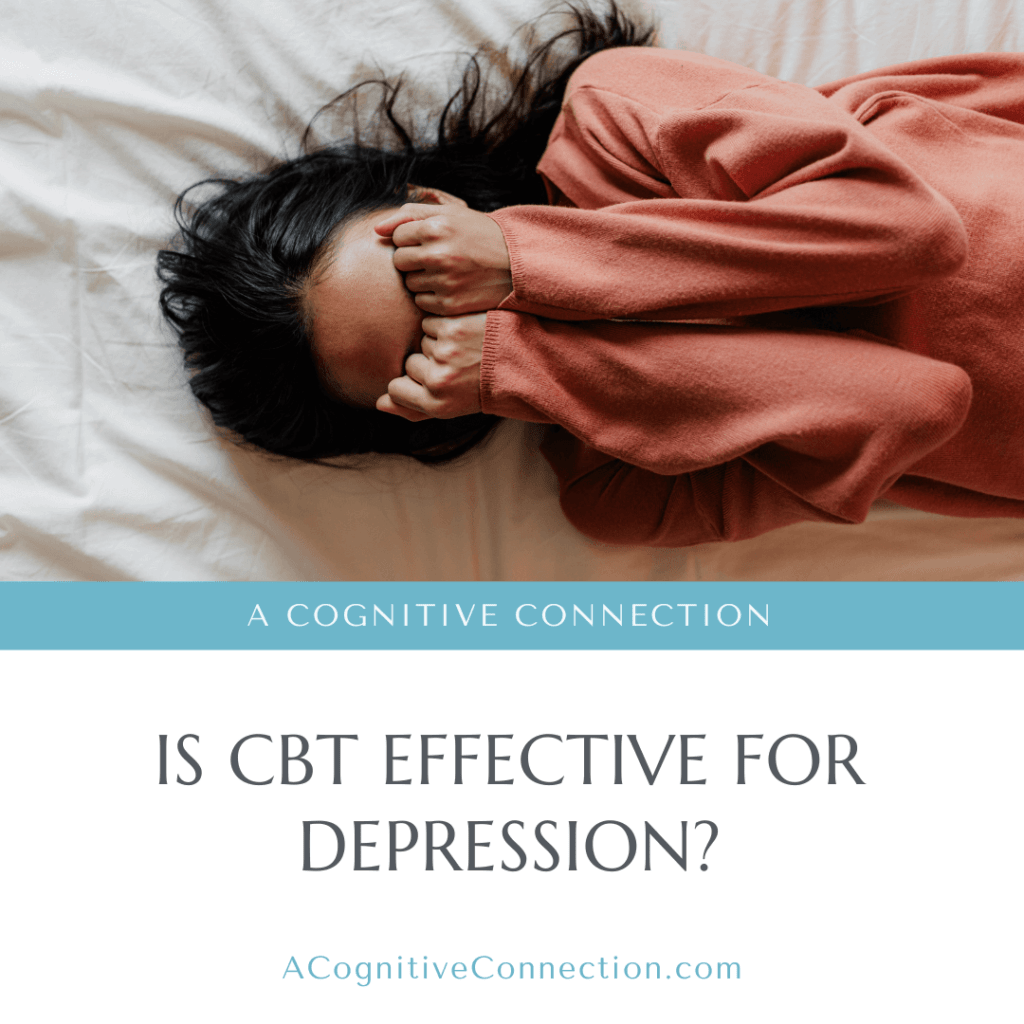If you or a loved one is suffering from depression, you know how it can affect every area of a person’s life. You might have a hard time getting out of bed in the morning or maintaining important relationships. You may even become suicidal and feel like life is not worth living. Treatment for depression has come a long way over the past few decades, however, and there is help available. Cognitive behavioral therapy, or CBT, is one of the most effective forms of therapy for depression and can help you get your life back.
If you are feeling depressed or suicidal, don’t wait to get help. A Cognitive Connection’s team of compassionate mental health professionals would love to help you build healthy habits and start feeling better. As a cognitive therapy center in Colorado Springs, we provide various therapies and educational programs to help you understand how your brain works and make necessary changes. Whether you choose to work with us or another mental health professional, we encourage you to start treating your depression today.
How Does CBT Work for Depression?
CBT is based on the assumption that our thoughts, emotions, physical feelings, and behaviors are all related. The way we think about a situation affects our response, so if we are struggling to cope with a particular problem, changing our thought patterns can help. CBT involves working with a therapist to identify negative and unhelpful thoughts and replace them with more positive alternatives.
CBT targets thoughts and actions that can lead to self-harming tendencies or to feelings of numbness. For example, you might think, “No one cares about me,” which can worsen feelings of depression and cause you to self-isolate. Your therapist might encourage you to list the people who do care about you, such as friends and family members. Remembering that you have people who care about you can cause feelings of hope and prompt you to reach out to them.
This type of cognitive restructuring is helpful for a range of mental illnesses, such as anxiety, OCD, and PTSD. CBT can be used to treat the following types of depression:
- Teenage depression
- Post-partum depression
- Situational depression and Seasonal Affective Disorder
- Bipolar depressive episodes
- Major Depressive Disorder
- Persistent Depressive Disorder
Therapy Vs. Medication for Depression
You may be ready to get help but aren’t sure if you should start with anti-depressants or therapy. Both can be very effective at improving quality of life. Some doctors and psychiatrists recommend starting with therapy and then adding medication if you aren’t seeing the results that you need.
A 2005 study by Arch Gen Psychiatry explored the effects of therapy vs. medication for treating moderate to severe depression. One group was on anti-depressants alone, and one group received cognitive therapy with no medication. The group on anti-depressants showed slightly higher treatment response rates initially, but the results were almost identical in each group after 16 weeks of treatment.
Your doctor or mental health professional can discuss treatment options with you in an initial appointment. They may recommend therapy, medication, or both, depending on your situation. CBT is currently considered the “gold standard” in psychotherapy because of the amount of research supporting it, but there are types of talk therapy for depression, such as EMDR, that your doctor or therapist may recommend.
CBT Techniques for Depression
Your therapist will ultimately decide what CBT techniques will be helpful for your unique situation and diagnosis, but here are a few common exercises that they may ask you to try:
1. Thought journaling
Thought journaling can be completed during a session or as homework in between sessions. Journaling allows you to process your thoughts and feelings and build self-awareness. Your therapist may ask you to use the ABC model, where you identify an “activating event,” record your “beliefs” about the event, and then determine the “consequences” of those beliefs. This will help you find negative thought patterns and also see how those patterns affect your behavior.
2. Cognitive restructuring
We gave an example of cognitive restructuring earlier when we talked about replacing negative beliefs with positive ones. Your therapist will help you evaluate patterns in your thoughts and self-talk that are contributing to depression and self-hatred. These negative patterns are often caused by cognitive distortions that prevent you from seeing the world accurately. Your therapist can help you counter these patterns with thoughts that are true and helpful.
3. Successive approximation
Successive approximation is a strategy that makes big tasks feel less overwhelming. This technique is also effective for those with ADHD or anxiety. This exercise encourages you to break a project down into smaller, manageable tasks. Depression can lead to inaction and lack of motivation, which can actually make you feel worse because you aren’t fulfilling your responsibilities. If going to work feels impossible, focusing on small tasks can help you get there. First, I just need to get out of bed. Then, I can shower, etc.
4. Guided discovery
In this technique, your therapist will ask you a series of questions to help you think about the way you process information and open up alternative ways of thinking. Guided discovery is a collaborative process that will help you reevaluate how you view the world.
How Long is CBT Therapy for Depression?
The recommended length of CBT treatment is between 12 and 24 sessions, regardless of your diagnosis. Practicing a new thought pattern is like strengthening a muscle, it takes time and consistent exercise. After a few months, you should be able to use the techniques you’ve learned independently and you’ll be better at identifying unhealthy patterns.
A 2011 study on treating depression with CBT showed that about half of patients showed rapid improvement between sessions 4 and 8, however. So you could start feeling better within a few weeks!
Explore CBT with A Cognitive Connection
If you are ready to overcome destructive thought patterns and seek help for depression, we’d love to help. Our mental health professionals have therapies and resources that can help with all aspects of brain function, from building healthy relationships to helping you overcome mental illness. Schedule a free consultation today, and we’ll come up with a treatment plan that’s right for you.


